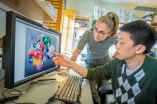(Press-News.org) Children who failed to acquire a basic math skill in first grade scored far behind their peers by seventh grade on a test of the mathematical abilities needed to function in adult life, according to researchers supported by the National Institutes of Health.
The basic math skill, number system knowledge, is the ability to relate a quantity to the numerical symbol that represents it, and to manipulate quantities and make calculations. This skill is the basis for all other mathematics abilities, including those necessary for functioning as an adult member of society, a concept called numeracy.
The researchers reported that early efforts to help children overcome difficulty in acquiring number system knowledge could have significant long-term benefits. They noted that more than 20 percent of U.S. adults do not have the eighth grade math skills needed to function in the workplace.
"An early grasp of quantities and numbers appears to be the foundation on which we build more complex understandings of numbers and calculations," said Kathy Mann Koepke, Ph.D., director of the Mathematics and Science Cognition and Learning: Development and Disorders Program at the Eunice Kennedy Shriver National Institute of Child Health and Human Development (NICHD), the NIH institute that sponsored the research. "Given the national priority on education in science, technology, engineering and math fields, it is crucial for us to understand how children become adept at math and what interventions can help those who struggle to build these skills."
Senior author David C. Geary, Ph.D., of the University of Missouri, Columbia, conducted the research with colleagues Mary K. Hoard, Ph.D., and Lara Nugent, and with Drew H. Bailey, Ph.D., of Carnegie Mellon University, Pittsburgh. The study appears online in PLoS One.
These results are part of a long-term study of children in the Columbia, Mo., school system. Initially, first graders from 12 elementary schools were evaluated on their number system knowledge. Number system knowledge encompasses several core principles:
Numbers represent different magnitudes (five is bigger than four).
Number relationships stay the same, even though numbers may vary. For example, the difference between 1 and 2 is the same as the difference between 30 and 31.
Quantities (for example, three stars) can be represented by symbolic figures (the numeral 3).
Numbers can be broken into component parts (5 is made up of 2 and 3 or 1 and 4).
The researchers also evaluated such cognitive skills as memory, attention span, and general intelligence.
The researchers found that by seventh grade, children who had the lowest scores on an assessment of number system knowledge in first grade lagged behind their peers. They noted that these differences in numeracy between the two groups were not related to intelligence, language skills or the method students used to make their computations.
For the testing at age 13, 180 of the students took timed assessments that included multiple-digit addition, subtraction, multiplication, and division problems; word problems; and comparisons and computations with fractions. Previous studies have shown that these tests evaluate functional numeracy―skills that adults need to join and succeed in the workplace. This might include the limited understanding of algebra needed to make change such as being able to provide an answer to a question such as: "If an item costs $1.40 and you give the clerk $2, how many quarters and how many dimes should you get back?" Other aspects of functional numeracy include the ability to manipulate fractions, as when doubling the ingredients in a recipe (for example, adding 1 ½ cups water when doubling a recipe that calls for ¾ cups water) or finding the center of a wall when wanting to center a painting or a shelf.
The researchers' analysis showed that a low score on the assessment of number system knowledge in first grade significantly increased a student's risk of getting a low functional numeracy score as a teenager.
The researchers examined learning and found that first graders with the lowest scores also had the slowest growth in number system knowledge throughout that school year. Starting with poor number knowledge can put children so far behind that they never catch up, the researchers said.
"These findings are especially valuable for bringing attention to the idea that numeracy early in life has profound effects not only for the individual, but also for the society that individual works and lives in," Dr. Mann Koepke said.
###
About the Eunice Kennedy Shriver National Institute of Child Health and Human Development (NICHD): The NICHD sponsors research on development, before and after birth; maternal, child, and family health; reproductive biology and population issues; and medical rehabilitation. For more information, visit the Institute's website at http://www.nichd.nih.gov/.
About the National Institutes of Health (NIH): NIH, the nation's medical research agency, includes 27 Institutes and Centers and is a component of the U.S. Department of Health and Human Services. NIH is the primary federal agency conducting and supporting basic, clinical, and translational medical research, and is investigating the causes, treatments, and cures for both common and rare diseases. For more information about NIH and its programs, visit http://www.nih.gov.
First grade math skills set foundation for later math ability
NIH funded study identifies fundamental skills needed for math functioning in adult life
2013-02-28
ELSE PRESS RELEASES FROM THIS DATE:
A game plan for climate change
2013-02-28
Researchers have successfully piloted a process that enables natural resource managers to take action to conserve particular wildlife, plants and ecosystems as climate changes.
The Adaptation for Conservation Targets (ACT) framework is a practical approach to assessing how future changes in air and water temperatures, precipitation, stream flows, snowpack, and other environmental conditions might affect natural resources. ACT enables scientists and managers to work hand-in-hand to consider how management actions may need to be adjusted to address those impacts.
"As ...
Changing shape makes chemotherapy drugs better at targeting cancer cells
2013-02-28
(Santa Barbara, Calif. –) Bioengineering researchers at University of California, Santa Barbara have found that changing the shape of chemotherapy drug nanoparticles from spherical to rod-shaped made them up to 10,000 times more effective at specifically targeting and delivering anti-cancer drugs to breast cancer cells.
Their findings could have a game-changing impact on the effectiveness of anti-cancer therapies and reducing the side effects of chemotherapy, according to the researchers. Results of their study were published recently in Proceedings of the National Academy ...
Retailers should re-size maternity wear for women throughout their pregnancies, MU study finds
2013-02-28
COLUMBIA, Mo. — Fashion retailers have seen an increase in demand for maternity wear in recent years, as sales for maternity clothing have increased while overall women's apparel sales have declined. Currently, most retailers produce maternity wear using a standardized size chart that begins with women in their seventh month of pregnancy. Retailers produce garments for women who are earlier in their terms by adjusting the sizes smaller proportionally based on the standardized chart. In a recent study, University of Missouri researcher MyungHee Sohn, an assistant professor ...
Reading the human genome
2013-02-28
Researchers with the U.S. Department of Energy (DOE)'s Lawrence Berkeley National Laboratory (Berkeley Lab) have achieved a major advance in understanding how genetic information is transcribed from DNA to RNA by providing the first step-by-step look at the biomolecular machinery that reads the human genome.
"We've provided a series of snapshots that shows how the genome is read one gene at a time," says biophysicist Eva Nogales who led this research. "For the genetic code to be transcribed into messenger RNA, the DNA double helix has to be opened and the strand of gene ...
Workstation design improvements for drone operators may reduce costs & mishaps, researchers suggest
2013-02-28
The U.S. Department of Defense reports that drone accidents in which personnel or aircraft are damaged or destroyed occur 50 times more often than mishaps involving human-operated aircraft. The U.S. Marines and Army reported 43 mishaps that involved human factors issues associated with drone ground control workstations and technology during 2006−2007.
Human factors/ergonomics (HF/E) researchers Qaisar Waraich, Thomas Mazzuchi, Shahram Sarkani, and David F. Rico suggest that multimillion-dollar drone losses might be prevented if long-established and broadly applied ...
Protein balance key in preventing cancer
2013-02-28
PHILADELPHIA, PA (February 27, 2013)—Two proteins that scientists once thought carried out the same functions are actually antagonists of each other, and keeping them in balance is key to preventing diseases such as cancer, according to new findings published in the February 25 issue of Developmental Cell by scientists at Fox Chase Cancer Center. The results suggest that new compounds could fight cancer by targeting the pathways responsible for maintaining the proper balance between the proteins.
"It's our job now to understand how we can intervene therapeutically in ...
NASA's Aquarius sees salty shifts
2013-02-28
The colorful images chronicle the seasonal stirrings of our salty world: Pulses of freshwater gush from the Amazon River's mouth; an invisible seam divides the salty Arabian Sea from the fresher waters of the Bay of Bengal; a large patch of freshwater appears in the eastern tropical Pacific in the winter. These and other changes in ocean salinity patterns are revealed by the first full year of surface salinity data captured by NASA's Aquarius instrument.
"With a bit more than a year of data, we are seeing some surprising patterns, especially in the tropics," said Aquarius ...
GSA Today: Putting time in its place
2013-02-28
Boulder, Colorado, USA – In the March issue of GSA Today, seven scientists from six countries, led by Jan Zalasiewicz of the University of Leicester, propose a realignment of the terms "geochronology" and "chronostratigraphy" in an attempt to resolve the debate of whether units of the Geological Time Scale should have a single (time) or dual (time and time-rock) hierarchy.
In their system, which retains both parallel sets of units, with an option to adopt one or other when appropriate, geochronology refers to all methods of numerical dating and is used to express the ...
Fermi's motion produces a study in spirograph
2013-02-28
VIDEO:
The Vela pulsar outlines a fascinating pattern in this movie showing 51 months of position and exposure data from Fermi's Large Area Telescope (LAT). The pattern reflects numerous motions of...
Click here for more information.
NASA's Fermi Gamma-ray Space Telescope orbits our planet every 95 minutes, building up increasingly deeper views of the universe with every circuit. Its wide-eyed Large Area Telescope (LAT) sweeps across the entire sky every three hours, capturing ...
Rapid, point-of-care tests for syphilis: The future of diagnosis
2013-02-28
Montreal, February 27th – Syphilis is on the rise worldwide and there is an urgent need for reliable and rapid screening, particularly for people who live in areas where access to healthcare is limited. An international research team, led by scientists at the Research Institute of the McGill University Health Centre (RI-MUHC) in Montreal, has demonstrated that rapid and point-of-care tests (POC) for syphilis are as accurate as conventional laboratory tests. The findings, which were published in PLoS ONE, call for a major change in approach to syphilis testing and recommend ...
LAST 30 PRESS RELEASES:
Maps can encourage home radon testing in the right settings
Exploring the link between hearing loss and cognitive decline
Machine learning tool can predict serious transplant complications months earlier
Prevalence of over-the-counter and prescription medication use in the US
US child mental health care need, unmet needs, and difficulty accessing services
Incidental rotator cuff abnormalities on magnetic resonance imaging
Sensing local fibers in pancreatic tumors, cancer cells ‘choose’ to either grow or tolerate treatment
Barriers to mental health care leave many children behind, new data cautions
Cancer and inflammation: immunologic interplay, translational advances, and clinical strategies
Bioactive polyphenolic compounds and in vitro anti-degenerative property-based pharmacological propensities of some promising germplasms of Amaranthus hypochondriacus L.
AI-powered companionship: PolyU interfaculty scholar harnesses music and empathetic speech in robots to combat loneliness
Antarctica sits above Earth’s strongest “gravity hole.” Now we know how it got that way
Haircare products made with botanicals protects strands, adds shine
Enhanced pulmonary nodule detection and classification using artificial intelligence on LIDC-IDRI data
Using NBA, study finds that pay differences among top performers can erode cooperation
Korea University, Stanford University, and IESGA launch Water Sustainability Index to combat ESG greenwashing
Molecular glue discovery: large scale instead of lucky strike
Insulin resistance predictor highlights cancer connection
Explaining next-generation solar cells
Slippery ions create a smoother path to blue energy
Magnetic resonance imaging opens the door to better treatments for underdiagnosed atypical Parkinsonisms
National poll finds gaps in community preparedness for teen cardiac emergencies
One strategy to block both drug-resistant bacteria and influenza: new broad-spectrum infection prevention approach validated
Survey: 3 in 4 skip physical therapy homework, stunting progress
College students who spend hours on social media are more likely to be lonely – national US study
Evidence behind intermittent fasting for weight loss fails to match hype
How AI tools like DeepSeek are transforming emotional and mental health care of Chinese youth
Study finds link between sugary drinks and anxiety in young people
Scientists show how to predict world’s deadly scorpion hotspots
ASU researchers to lead AAAS panel on water insecurity in the United States
[Press-News.org] First grade math skills set foundation for later math abilityNIH funded study identifies fundamental skills needed for math functioning in adult life




